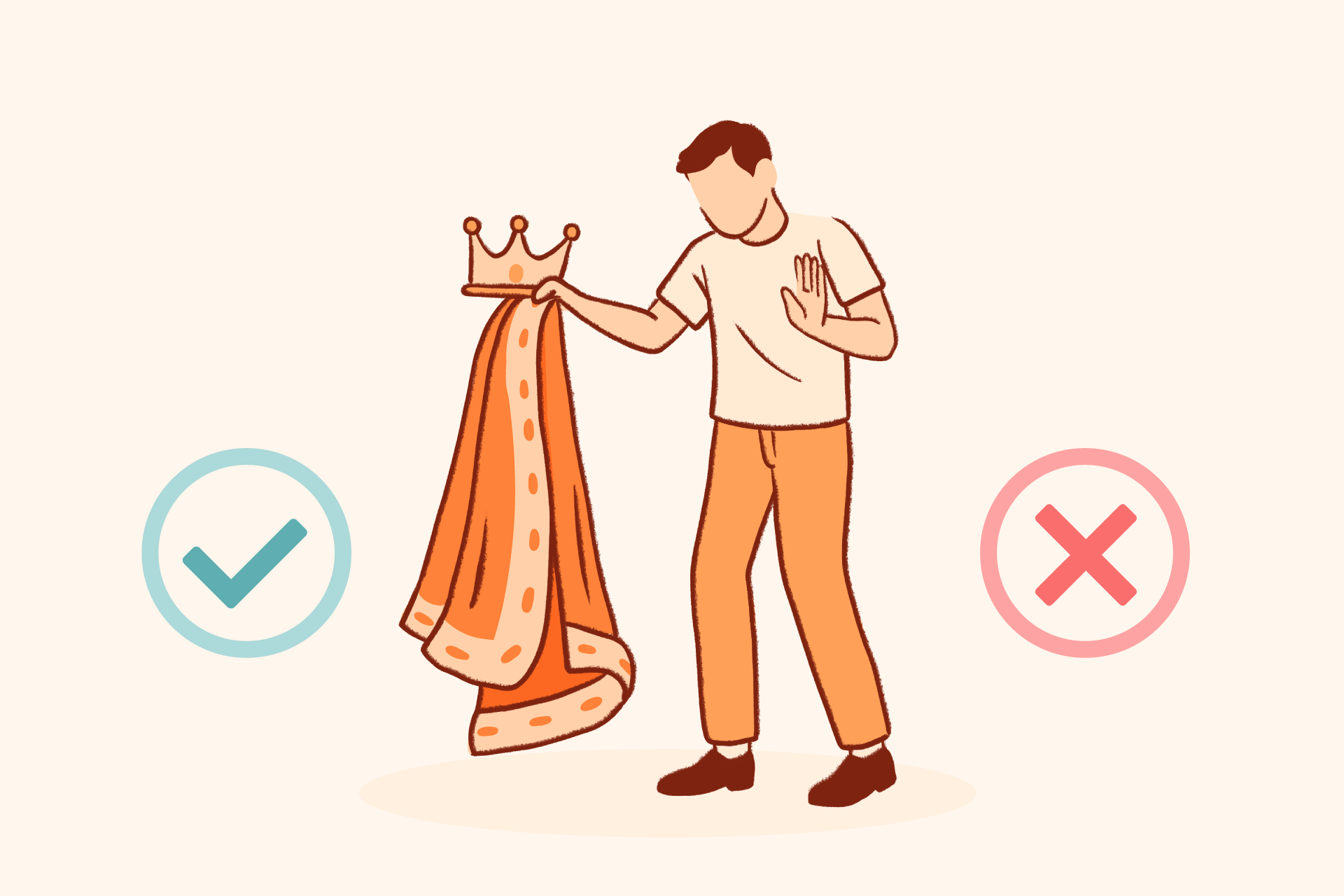What Is Self-Loathing? 4 Hidden Causes Behind Self-Rejection and What You Can Do to Stop It



Dr. Jack Bartel (he/him) is a licensed clinical psychologist and LGBTQ+ health educator and consultant. He received his doctorate of clinical psychology from Florida Tech and completed his predoctoral internship at Jackson Memorial Hospital in Miami and his postdoctoral residency at the Orlando VA.
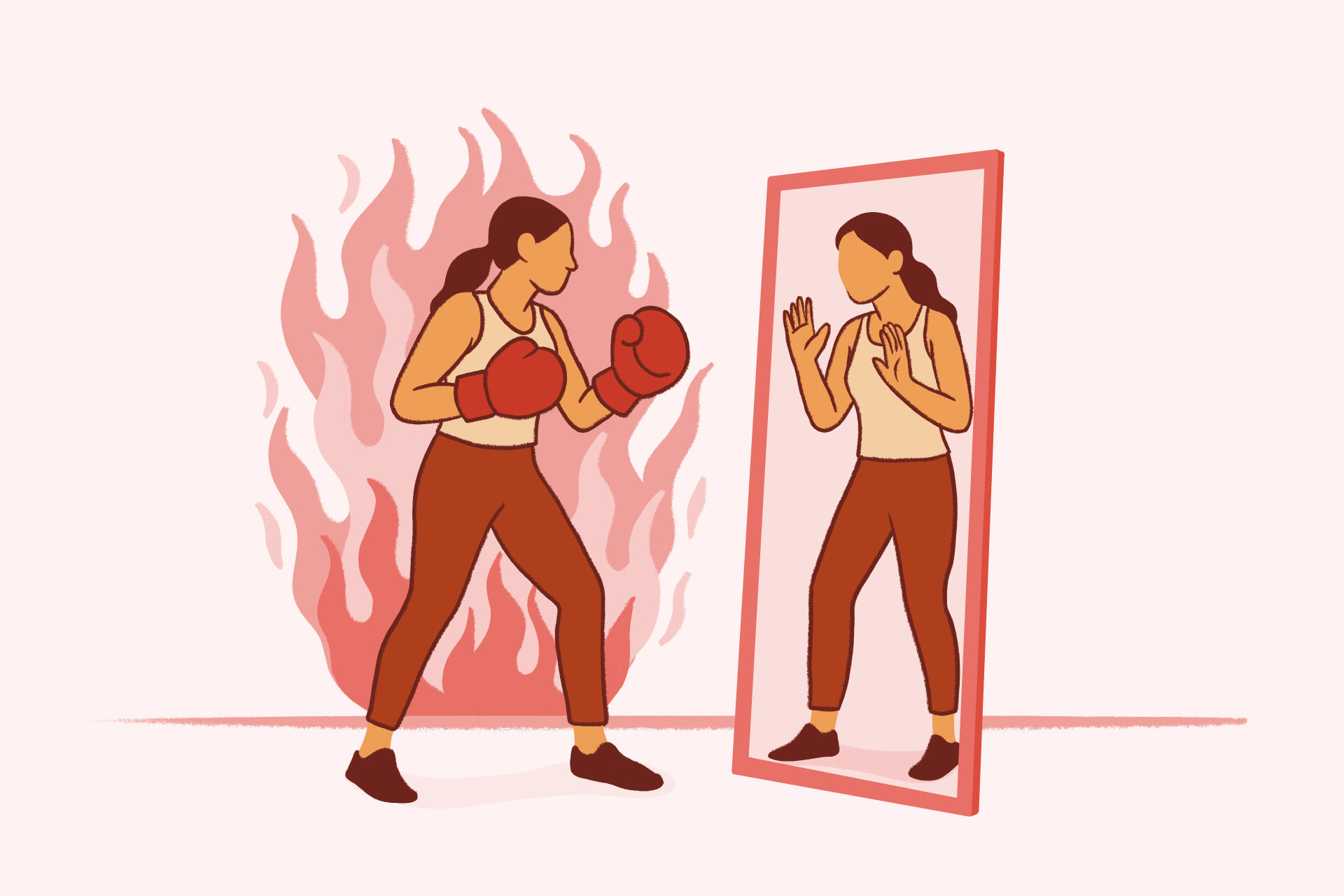



Dr. Jack Bartel (he/him) is a licensed clinical psychologist and LGBTQ+ health educator and consultant. He received his doctorate of clinical psychology from Florida Tech and completed his predoctoral internship at Jackson Memorial Hospital in Miami and his postdoctoral residency at the Orlando VA.
Self-loathing is a deep-seated sense of dislike or hatred toward yourself. It can show up as persistent self-criticism, shame, and a belief that you’re fundamentally flawed or unworthy. For many, it’s not just an occasional feeling. It’s a relentless inner voice that impacts their relationships, work, and how well you generally feel in your day-to-day life.
Let’s explore the roots of self-loathing, what it looks like in everyday life, and how to start healing.
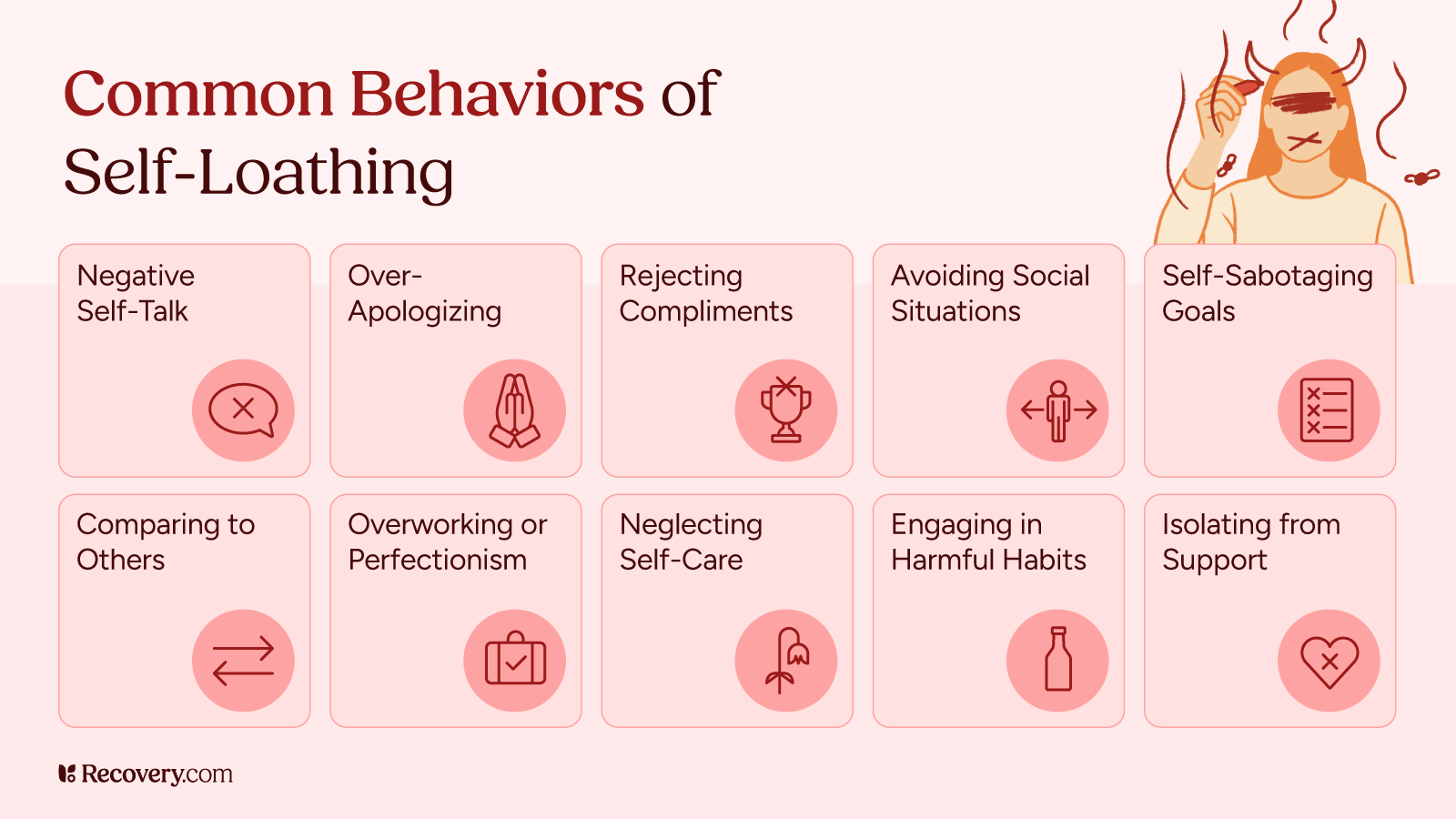
Beyond Bad Days: What Self-Loathing Really Means
Self-loathing isn’t just feeling bad about a mistake or a bad day. It’s an ongoing internal narrative that says, “I’m not good enough,” “I’m a failure,” or “I don’t deserve love or respect.” This harsh self-judgment may be obvious or subtle. Either way, it shapes your thoughts, emotions, and behaviors.
Self-loathing is often linked with mental health conditions like depression, anxiety, and complex trauma. It can lead to isolation, perfectionism, or self-destructive behaviors as you try to manage the pain of not feeling good enough.
Do You Recognize These Self-Loathing Patterns?
Signs of self-loathing1 can look different for everyone, but common examples include:
- Constantly apologizing, even when you’re not at fault
- Avoiding opportunities due to a belief that you’re not good enough
- Harsh self-talk (“I’m so stupid,” “I ruin everything”)
- Difficulty accepting compliments or kindness
- Sabotaging your relationships or achievements
- Feeling like a burden or imposter
- Engaging in unhealthy coping behaviors like self-harm, binging and purging, poor sleep, lack of exercise, or substance use
- Neglecting self-care
- Having suicidal thoughts
If any of these patterns feel familiar, you may be wondering how you got here in the first place. Recognizing these signs is the first step, but understanding where they come from is what leads to real healing.
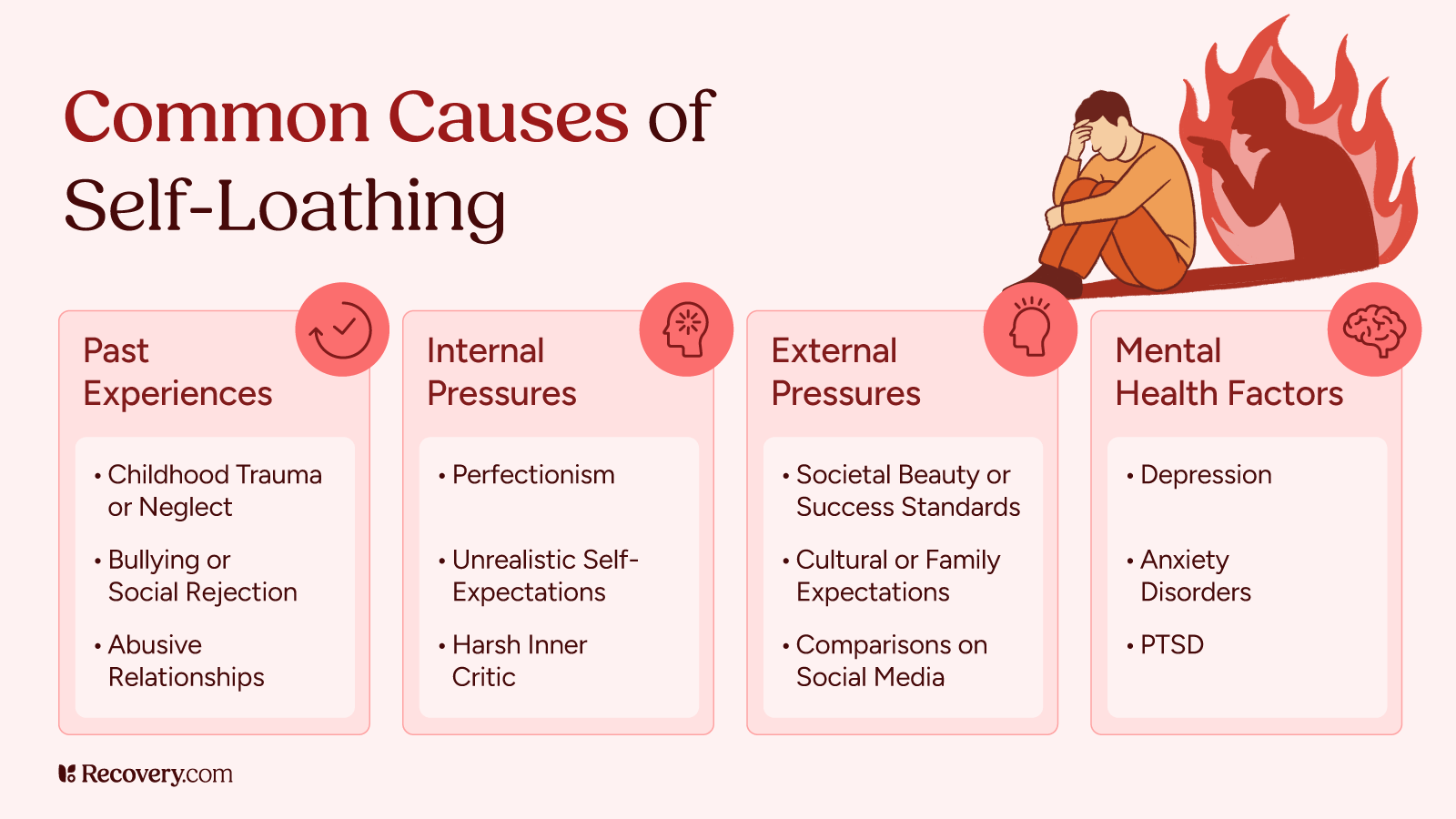
Explore Depression Treatment Centers
What Causes Self-Loathing?
Self-loathing doesn’t develop overnight. It often grows over time through a combination of personal experiences, mental health challenges, and social conditioning. These are some of the most common contributing factors:
1. Childhood Experiences
Trauma and adverse childhood experiences2 leave lasting marks on how you see yourself. Physical, emotional, or sexual abuse, neglect, and bullying during childhood can deeply impact your self-worth, planting seeds of shame and unworthiness that grow over time.
Growing up in families with negative dynamics also shapes your inner voice. When love feels conditional, criticism is constant, or emotional support is absent, you learn to internalize the belief that you’re flawed or unlovable. This becomes the foundation for low self-esteem, self-criticism, and that harsh inner critic that follows you into adulthood.
Even without obvious trauma, a lack of support and validation can be damaging. When you don’t receive adequate emotional nurturing, empathy, or encouragement as a child, you struggle to develop a secure sense of self.3 This makes you more vulnerable to self-loathing later in life, as you never learned that you were inherently worthy of love and acceptance.
If these resonate with you, our in-depth article on childhood trauma explores how these early wounds affect you as an adult—and what you can do about it.
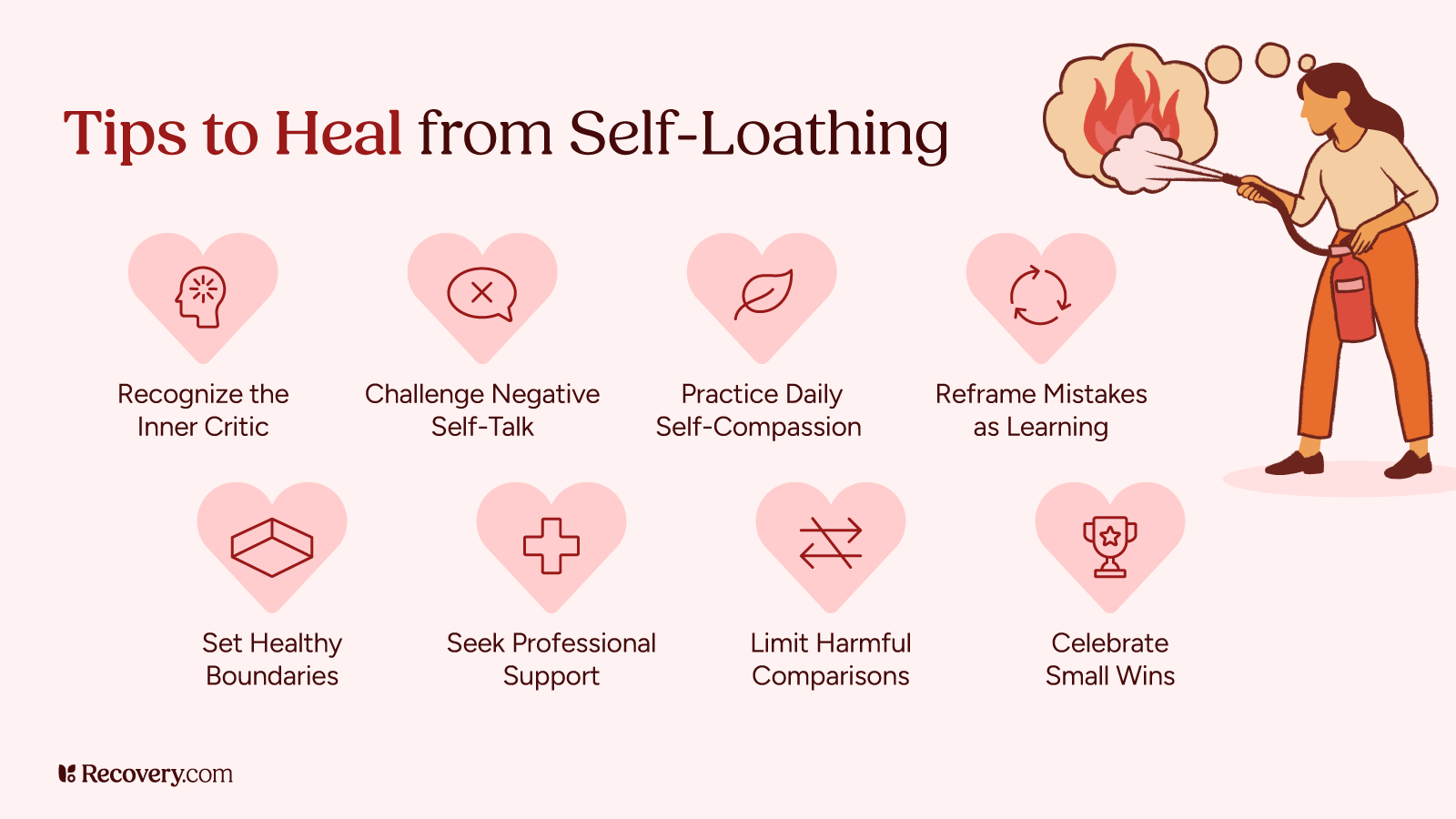
2. Mental Health Conditions
Anxiety and depression create the perfect storm for self-loathing.4 These common mental health conditions bring persistent negative self-talk, overwhelming guilt, feelings of hopelessness, and crushing low self-esteem—all of which feed into and reinforce the belief that you’re not good enough.
Personality disorders, particularly borderline personality disorder (BPD),5 can intensify these feelings even further. The intense emotional pain, unstable sense of who you are, and chronic feelings of worthlessness that come with these conditions make self-loathing feel inescapable.
Eating disorders like anorexia and bulimia are especially intertwined with self-hatred. The distorted body image and relentless perfectionism that drive these disorders fuel harsh self-criticism and can even increase thoughts of self-harm or suicide.6
3. Social and Cultural Factors
Social media and constant comparison7 culture have made self-loathing almost inevitable. In today’s hyper-connected world, you’re bombarded with curated highlight reels that make you feel like you’re not measuring up. This endless comparison can reinforce feelings of inadequacy and flood your mind with negative thoughts about yourself.
Society’s obsession with perfection8 doesn’t help either. When you’re surrounded by messages that idolize flawless productivity, beauty, and success, you create impossible standards for yourself. And when you inevitably fall short of these unrealistic expectations, you may get stuck replaying your mistakes over and over in a cycle of harsh self-judgment.
Bullying and marginalization leave deep scars that often turn inward. Whether it’s workplace exclusion, childhood bullying, or discrimination based on your identity, these experiences damage your self-esteem and teach you to internalize shame.
4. Other Sneaky Ways Self-Loathing Takes Hold
Negative Self-Talk
When you repeatedly tell yourself things like “I’m worthless,” “I’m a burden,” or “I hate myself,” those thoughts don’t just disappear—they become ingrained beliefs that shape how you see yourself. The more you repeat these patterns, the more real they feel.
Unresolved Guilt or Shame
Whether it’s something you did years ago or shame you’ve carried since childhood, these lingering feelings fester when left unaddressed. Over time, they can evolve into a broader self-hatred, making it hard to forgive yourself or move forward.
Building a Kinder Inner Voice: Steps Toward Self-Love
Healing from self-loathing is possible, but it requires time, patience, and often support. Here are some small steps you can start taking today:
- Notice your self-loathing thoughts without judgment. Awareness and mindfulness are the first steps to shifting these patterns—you can’t change what you don’t see.
- Challenge your negative self-talk. Replace harsh inner dialogue with more compassionate, realistic thoughts. This helps you change how you see yourself and reduces self-loathing behaviors.
- Practice self-compassion. Learn to treat yourself with the same kindness you’d offer a friend or loved one. Self-love, self-acceptance, and self-confidence are key to overcoming self-hate.
- Set boundaries with harmful people and environments. Protecting yourself from toxic influences means you’ll have less chances to reinforce negative self-beliefs.
- Celebrate your small wins. Giving yourself credit for your progress starts to shift your internal narrative and ease self-doubt.
- Build healthy relationships. Surround yourself with people who respect, affirm, and support you. These connections offer perspective and emotional safety, and remind you that you’re worthy of love.
- Take good care of yourself. Caring for your physical and emotional health through sleep, nutrition, movement, creative expression, or spiritual connection supports a more balanced sense of self. Small, consistent acts of care send a message to yourself that you’re worth investing in.
You Don’t Have to Do This Alone
Self-loathing thrives in isolation, but healing happens in connection. Working with a mental health professional can be life-changing, especially when they’re trained in trauma-informed or compassion-focused approaches that get to the root of your pain.
If you’re ready to break free from self-hatred, consider looking for a trauma-informed mental health treatment program that understands how past experiences shape your relationship with yourself.
FAQs
Q. What is self-loathing a symptom of?
A: Self-loathing often signals depression, anxiety, complex trauma, personality disorders (especially borderline), or eating disorders. It can also come from internalized messages from childhood abuse, bullying, or discrimination. While not a diagnosis itself, it usually points to deeper emotional pain that needs attention.
Q. What can I say to someone who is self-loathing?
A: Respond with empathy, not correction. Try something like, “I hear how much pain you’re in—you don’t deserve to feel this way about yourself,” or “You’re not alone in this.” Avoid arguing with their feelings and instead validate their pain while gently reminding them of their worth.
Q. What is the root cause of self-hatred?
A: Self-hatred typically stems from early experiences of shame, rejection, trauma, or emotional invalidation. Children internalize negative messages that become part of how they see themselves. For many from marginalized or stigmatized communities, self-hatred may also come from internalized oppression or cultural rejection. It’s rarely one event—it’s usually a pattern of being made to feel “not good enough” or unworthy of love.
Q Is self-loathing a defense mechanism?
A: Sometimes, yes. It can develop as protection against rejection: a belief that if you reject yourself first, it won’t hurt as much when others do. While this might have helped you survive painful experiences in the past, over time, it can block your growth and healing.
Q. Can I overcome feelings of self-loathing?
A: Absolutely. Self-loathing is treatable through therapy, self-compassion, healthy relationships, and challenging negative thought patterns. It takes time, but you can unlearn the belief that you’re unworthy. You’re not broken, you’re hurting, and healing is something you deserve.
-
Self-Loathing: Meaning, Symptoms and Treatment. 4 Oct. 2022, https://www.medicalnewstoday.com/articles/self-loathing.
-
CDC. “About Adverse Childhood Experiences.” Adverse Childhood Experiences (ACEs), 31 Jan. 2025, https://www.cdc.gov/aces/about/index.html.
-
Lesley, Abbott, and Moylett Helen. Working With The Under Threes: Responding To Children’S Needs: Responding to Children’s Needs. McGraw-Hill Education (UK), 1997.
-
Zahn R, Lythe KE, Gethin JA, Green S, Deakin JF, Young AH, Moll J. The role of self-blame and worthlessness in the psychopathology of major depressive disorder. J Affect Disord. 2015 Nov 1;186:337-41. doi: 10.1016/j.jad.2015.08.001. Epub 2015 Aug 5. PMID: 26277271; PMCID: PMC4573463.
-
Ille R, Schöggl H, Kapfhammer HP, Arendasy M, Sommer M, Schienle A. Self-disgust in mental disorders -- symptom-related or disorder-specific? Compr Psychiatry. 2014 May;55(4):938-43. doi: 10.1016/j.comppsych.2013.12.020. Epub 2014 Jan 3. PMID: 24480418.
-
Lieberman, Amy, et al. “Self-Hate, Dissociation, and Suicidal Behavior in Bulimia Nervosa.” Journal of Affective Disorders, vol. 335, Aug. 2023, pp. 44–48. ScienceDirect, https://doi.org/10.1016/j.jad.2023.05.015.
-
Taylor, Jacqui, and Georgina Armes. “Social Comparison on Instagram, and Its Relationship with Self-Esteem and Body-Esteem.” Discover Psychology, vol. 4, no. 1, Oct. 2024, p. 126. Springer Link, https://doi.org/10.1007/s44202-024-00241-3.
-
Kelly JD 4th. Your Best Life: Perfectionism--The Bane of Happiness. Clin Orthop Relat Res. 2015 Oct;473(10):3108-11. doi: 10.1007/s11999-015-4279-9. Epub 2015 Apr 3. PMID: 25836762; PMCID: PMC4562912.
Our Promise
How Is Recovery.com Different?
We believe everyone deserves access to accurate, unbiased information about mental health and recovery. That’s why we have a comprehensive set of treatment providers and don't charge for inclusion. Any center that meets our criteria can list for free. We do not and have never accepted fees for referring someone to a particular center. Providers who advertise with us must be verified by our Research Team and we clearly mark their status as advertisers.
Our goal is to help you choose the best path for your recovery. That begins with information you can trust.








